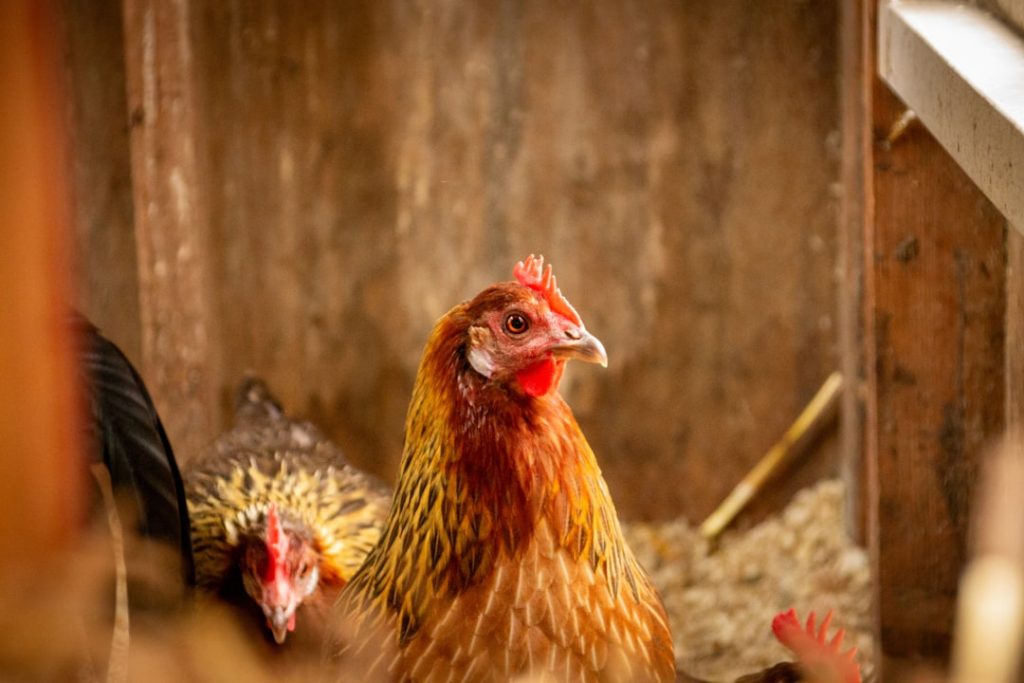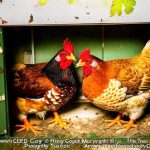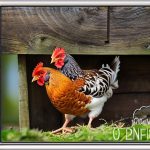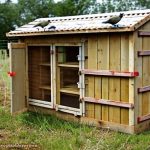Housing and space requirements for poultry are critical factors in ensuring the health and productivity of birds. Proper housing should be well-ventilated, spacious, and secure to protect poultry from predators and adverse weather conditions. The specific space requirements vary depending on the bird species and the purpose of production, such as egg-laying, meat production, or breeding.
For egg-laying hens, a minimum of 1.5 to 2 square feet of space per bird in the coop is recommended. This allows hens to engage in natural behaviors like nesting, perching, and dust bathing. Meat birds, such as broilers, require at least 1 square foot per bird to prevent overcrowding and ensure proper growth.
Breeding birds need additional space to accommodate mating and nesting activities. Poultry housing should be equipped with appropriate lighting, heating, and ventilation systems to maintain a healthy environment. Regular cleaning and disinfection of the housing are essential to prevent disease transmission and maintain hygiene.
Providing adequate housing and space for poultry is fundamental to their well-being and productivity. It is crucial to consider the specific needs of different bird species and production purposes when designing and maintaining poultry housing facilities.
Table of Contents
Key Takeaways
- Housing and Space Requirements:
- Provide adequate space for the animals to move and express natural behaviors.
- Ensure proper ventilation and drainage in the housing area.
- Use appropriate bedding materials for comfort and hygiene.
- Feeding and Nutrition:
- Provide a balanced diet with the right mix of nutrients for optimal growth and health.
- Ensure access to clean and fresh water at all times.
- Monitor feed intake and adjust as needed to prevent overfeeding or underfeeding.
- Health and Disease Management:
- Implement a regular vaccination and deworming program.
- Monitor animals for signs of illness and seek veterinary care when necessary.
- Practice good hygiene and biosecurity measures to prevent the spread of diseases.
- Temperature and Ventilation Control:
- Maintain a comfortable temperature range for the animals, especially during extreme weather conditions.
- Ensure proper ventilation to prevent the buildup of harmful gases and pathogens.
- Provide shelter and insulation to protect animals from temperature extremes.
- Light Management:
- Provide a natural light cycle to promote normal behavior and reproductive patterns.
- Use artificial lighting to supplement natural light as needed, especially in indoor housing systems.
- Monitor light intensity and duration to prevent stress or behavioral issues.
- Handling and Welfare:
- Handle animals gently and with care to minimize stress and injuries.
- Provide enrichment activities to promote mental and physical well-being.
- Regularly assess and improve welfare standards based on industry best practices.
- Marketing and Sales Strategy:
- Identify target markets and tailor products to meet their specific needs and preferences.
- Develop a strong brand and marketing message to differentiate products in the market.
- Build relationships with buyers and distributors to ensure a steady and profitable sales channel.
Feeding and Nutrition
Nutritional Requirements for Egg-Laying Hens
Egg-laying hens require a diet rich in calcium to support the production of strong eggshells. A balanced feed that includes essential amino acids, vitamins, and minerals is also necessary to support overall health and egg production.
Nutritional Requirements for Meat Birds
Meat birds, such as broilers, require a high-protein diet to support rapid growth and muscle development. A diet that meets their specific nutritional needs is crucial for optimal growth and productivity.
Access to Clean Water
In addition to a balanced diet, it is essential to ensure that birds have access to clean water at all times. Water is vital for digestion, temperature regulation, and overall health. Regularly cleaning and refilling waterers is necessary to provide birds with clean and fresh water.
Overall, feeding and nutrition are critical aspects of poultry management that directly impact the health and productivity of birds. Providing a balanced diet that meets the specific nutritional requirements of birds at different stages of their life cycle is essential for optimal health and productivity.
Health and Disease Management
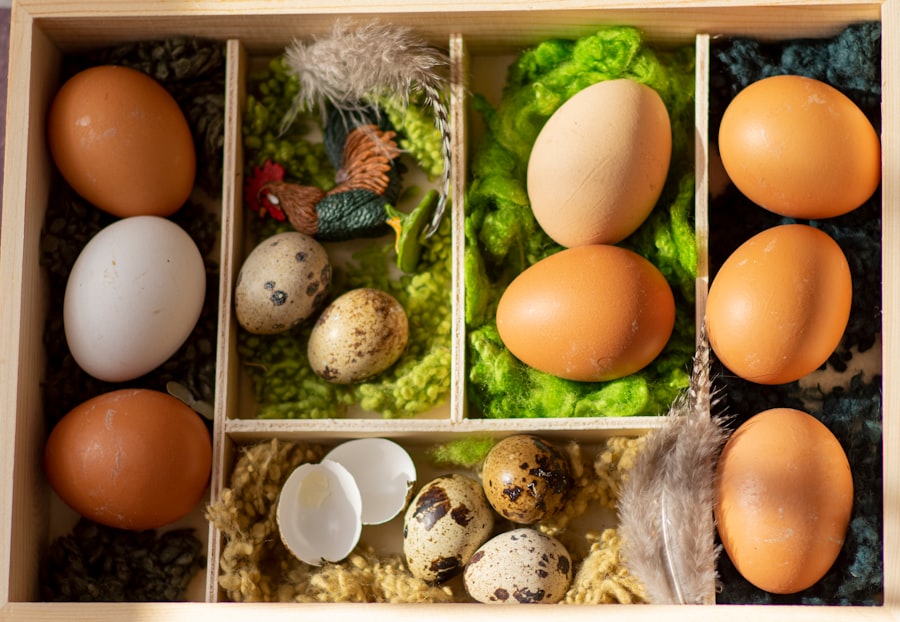
Maintaining the health of poultry is essential for ensuring their well-being and productivity. It is important to implement a comprehensive health and disease management program to prevent the spread of diseases and address any health issues that may arise. Regular health checks are essential for monitoring the overall health of the birds and identifying any potential issues early on.
This may include checking for signs of illness, monitoring weight gain or loss, and observing behavior patterns. It is important to work with a veterinarian to develop a health management plan that includes vaccination schedules, parasite control, and disease prevention strategies. In addition to regular health checks, it is important to maintain good hygiene practices in the housing and feeding areas to prevent the spread of diseases.
This may include regular cleaning and disinfection of the housing, proper waste management, and controlling access to wild birds or rodents that may carry diseases. Overall, implementing a comprehensive health and disease management program is essential for maintaining the well-being and productivity of poultry. It is important to monitor the health of the birds regularly, work with a veterinarian, and maintain good hygiene practices to prevent the spread of diseases.
Temperature and Ventilation Control
Maintaining proper temperature and ventilation control is essential for creating a comfortable and healthy environment for poultry. Poultry are sensitive to temperature extremes and require a well-regulated environment to thrive. During cold weather, it is important to provide adequate heating in the housing to keep the birds warm.
This may include using heaters or heat lamps to maintain a comfortable temperature for the birds. It is important to monitor temperature levels regularly and make adjustments as needed to ensure the birds are not exposed to extreme cold temperatures. During hot weather, it is important to provide adequate ventilation in the housing to prevent heat stress in the birds.
This may include using fans or opening windows to allow for air circulation and cooling. It is important to monitor temperature levels regularly and provide shade or cooling measures as needed to prevent heat stress in the birds. Overall, maintaining proper temperature and ventilation control is essential for creating a comfortable environment for poultry.
It is important to monitor temperature levels regularly, provide heating or cooling measures as needed, and ensure adequate ventilation in the housing to prevent temperature extremes.
Light Management
Light management plays a crucial role in regulating the behavior and productivity of poultry. Providing the right amount of light at the right time can influence egg production, growth rates, and overall well-being of the birds. For egg-laying hens, providing a consistent lighting schedule can stimulate egg production and maintain a regular laying cycle.
It is important to provide 14-16 hours of light per day to encourage optimal egg production. This may include using artificial lighting in the housing during darker months or adjusting natural lighting patterns as needed. For meat birds such as broilers, providing a consistent lighting schedule can also influence growth rates and overall well-being.
It is important to provide 23 hours of light per day during the first week of life to encourage feeding behavior and reduce stress. After the first week, it is recommended to provide 18-20 hours of light per day to support growth rates. Overall, light management plays a crucial role in regulating the behavior and productivity of poultry.
It is important to provide the right amount of light at the right time to support egg production, growth rates, and overall well-being of the birds.
Handling and Welfare
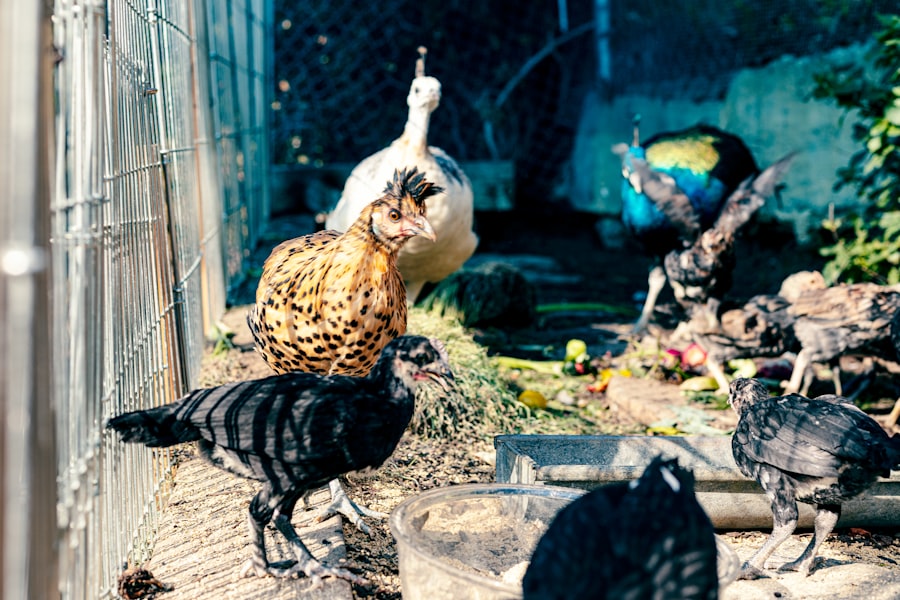
Approaching and Handling Birds
When handling poultry, it is vital to approach them calmly and avoid sudden movements that may startle or stress the birds. Handling birds gently but firmly can help minimize stress and prevent injuries. Using proper handling techniques, such as catching birds by their legs or wings, can also reduce stress during handling.
Creating a Comfortable Environment
In addition to proper handling techniques, providing a comfortable and enriching environment for the birds is essential. This can include providing perches, nesting boxes, dust bathing areas, and access to outdoor areas for foraging. Creating a comfortable environment that supports natural behaviors can help reduce stress and promote overall welfare in poultry.
Key Takeaways
Overall, proper handling and welfare practices are essential for ensuring the well-being of poultry. It is crucial to handle birds gently but firmly, provide a comfortable environment that supports natural behaviors, and minimize stress during routine management practices. By following these guidelines, poultry farmers can promote the health and well-being of their birds.
Marketing and Sales Strategy
Developing a marketing and sales strategy is essential for successfully selling poultry products such as eggs or meat. It is important to identify target markets, develop branding strategies, and establish distribution channels that reach potential customers. When developing a marketing strategy for poultry products, it is important to identify target markets such as local consumers, restaurants, grocery stores, or specialty markets.
Understanding the needs and preferences of potential customers can help tailor marketing efforts to reach specific target markets effectively. In addition to identifying target markets, developing a strong brand identity can help differentiate poultry products from competitors in the market. This may include developing a unique brand name, logo, packaging design, or marketing message that resonates with potential customers.
Establishing distribution channels that reach potential customers is also essential for successfully selling poultry products. This may include selling products directly to consumers through farmers’ markets or online platforms, partnering with local retailers or restaurants, or distributing products through wholesale channels. Overall, developing a marketing and sales strategy is essential for successfully selling poultry products.
It is important to identify target markets, develop branding strategies that differentiate products from competitors, and establish distribution channels that reach potential customers effectively.
If you’re interested in learning more about keeping broiler chickens, you may also want to check out this article on chicken coop door size. It provides valuable information on the importance of the size of the coop door for the well-being of your chickens.
FAQs
What are broiler chickens?
Broiler chickens are a type of chicken that are specifically bred and raised for meat production. They are typically raised for a short period of time, usually around 6-8 weeks, before being processed for their meat.
How do you keep broiler chickens?
To keep broiler chickens, you will need to provide them with a suitable housing environment that is well-ventilated, clean, and free from drafts. You will also need to provide them with access to clean water, a balanced diet of high-quality feed, and proper lighting to encourage growth.
What do broiler chickens eat?
Broiler chickens are typically fed a diet of high-quality commercial feed that is specifically formulated to meet their nutritional needs for rapid growth. This feed is usually high in protein and energy to support their growth and development.
How do you care for the health of broiler chickens?
To care for the health of broiler chickens, it is important to regularly monitor their environment for cleanliness and proper ventilation. Additionally, providing them with access to clean water, a balanced diet, and regular veterinary care can help to ensure their health and well-being.
What are some common challenges in keeping broiler chickens?
Some common challenges in keeping broiler chickens include managing their growth rate to prevent health issues, maintaining proper ventilation and cleanliness in their housing environment, and preventing the spread of diseases within the flock. Additionally, ensuring that they have access to a balanced diet and clean water is essential for their well-being.
Meet Walter, the feathered-friend fanatic of Florida! Nestled in the sunshine state, Walter struts through life with his feathered companions, clucking his way to happiness. With a coop that’s fancier than a five-star hotel, he’s the Don Juan of the chicken world. When he’s not teaching his hens to do the cha-cha, you’ll find him in a heated debate with his prized rooster, Sir Clucks-a-Lot. Walter’s poultry passion is no yolk; he’s the sunny-side-up guy you never knew you needed in your flock of friends!

